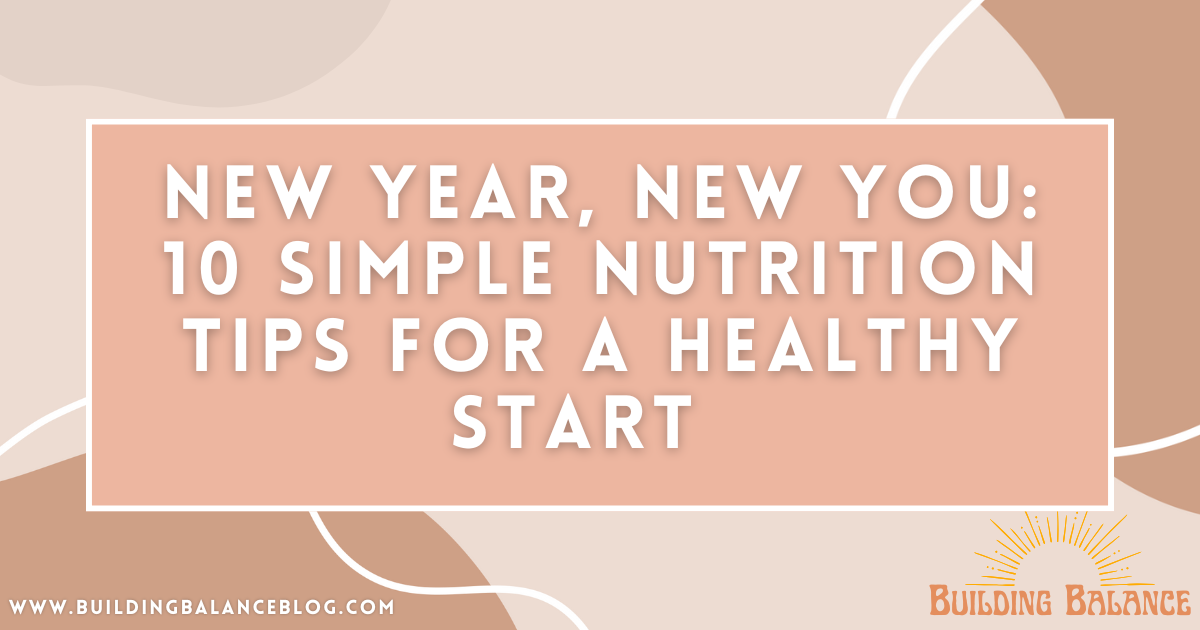
As the new year unfolds, many of us find ourselves setting resolutions to become healthier, fitter, and more vibrant versions of ourselves. While lofty goals can be inspiring, it’s often the simple, sustainable habits that yield the most lasting results. Nutrition plays a crucial role in this journey, and with a few easy tweaks, you can set yourself up for success. Here are ten practical nutrition tips to help you start the year strong and stay on track.
1. Hydrate, Hydrate, Hydrate
One of the simplest yet most overlooked aspects of good nutrition is proper hydration. Your body needs water to function optimally, from regulating temperature to aiding digestion and flushing out toxins. Start your day with a glass of water and aim for at least 8-10 cups daily. Add slices of lemon, cucumber, or fresh herbs like mint to make hydration more enjoyable. If you struggle to drink enough water, consider using a water-tracking app or carrying a reusable water bottle as a reminder.
2. Prioritize Whole Foods
The foundation of a nutritious diet is whole, unprocessed foods. Think fruits, vegetables, lean proteins, whole grains, nuts, and seeds. These foods are packed with vitamins, minerals, and fiber that support overall health. To simplify, shop the perimeter of the grocery store where fresh produce, meats, and dairy are usually located. Minimizing processed foods can help reduce your intake of added sugars, unhealthy fats, and excess sodium.
3. Don’t Skip Breakfast
Breakfast is often called the most important meal of the day for good reason. Eating a balanced breakfast can jumpstart your metabolism, stabilize blood sugar levels, and provide energy for the day ahead. Opt for a combination of protein, healthy fats, and complex carbohydrates, such as Greek yogurt with berries and granola, avocado toast with an egg, or a smoothie with spinach, almond butter, and a banana.
4. Plan and Prep Your Meals
Meal planning and preparation are game-changers for maintaining a healthy diet. Take some time each week to plan your meals, create a shopping list, and prep ingredients. Having ready-to-eat options reduces the temptation to order takeout or grab unhealthy snacks. Batch cooking soups, roasting vegetables, and portioning out snacks are great strategies to stay on track during busy weeks.
5. Practice Mindful Eating
Mindful eating involves paying full attention to your food, savoring each bite, and tuning into your body’s hunger and fullness cues. This practice can prevent overeating and help you enjoy your meals more. Start by eating without distractions like TV or smartphones. Take smaller bites, chew slowly, and focus on the flavors and textures of your food. Mindfulness can transform your relationship with eating and foster healthier habits.
6. Incorporate More Plant-Based Meals
You don’t have to go fully vegetarian or vegan to reap the benefits of plant-based eating. Adding more plant-based meals to your diet can increase your intake of fiber, antioxidants, and essential nutrients while reducing saturated fat and cholesterol. Try incorporating meatless Mondays or experimenting with dishes like lentil curry, quinoa salad, or roasted vegetable bowls.
7. Snack Smart
Snacking isn’t inherently bad—it’s all about making smart choices. Healthy snacks can keep your energy levels stable and prevent overeating at mealtime. Choose nutrient-dense options like a handful of nuts, hummus with veggie sticks, or a piece of fruit with a smear of almond butter. Keep healthy snacks on hand at work or in your bag to avoid reaching for chips or candy when hunger strikes.
8. Balance Your Plate
A balanced plate ensures you’re getting a variety of nutrients at every meal. The ideal plate should include:
Half vegetables and fruits for vitamins, minerals, and fiber
A quarter lean protein like chicken, fish, tofu, or beans
A quarter whole grains like brown rice, quinoa, or whole-grain bread Adding healthy fats like avocado, olive oil, or nuts can also enhance flavor and satiety.
9. Limit Added Sugars
While natural sugars in fruits and dairy are part of a healthy diet, added sugars can contribute to weight gain, energy crashes, and an increased risk of chronic diseases. Start by reading nutrition labels to identify hidden sugars in packaged foods. Swap sugary beverages like soda for sparkling water or herbal teas, and satisfy your sweet tooth with naturally sweet options like fruit or dark chocolate.
10. Set Realistic Goals and Track Progress
Setting specific, achievable nutrition goals can help you stay motivated. Whether it’s drinking more water, cooking at home three nights a week, or eating five servings of vegetables daily, having a clear plan is key. Use a journal, app, or calendar to track your progress and celebrate small victories. Remember, it’s not about perfection but consistency over time.
Starting the new year with a focus on nutrition doesn’t have to be overwhelming. By implementing these simple tips, you can build a foundation for lasting health and well-being. Small, consistent changes lead to big results, so pick a few tips to start with and gradually incorporate more as you feel ready. Here’s to a healthier, happier you in the year ahead!
What are your favorite nutrition tips or habits for starting the year strong? Share in the comments below—we’d love to hear from you!


Leave a Reply